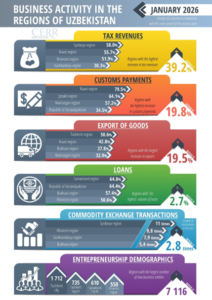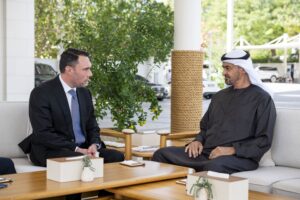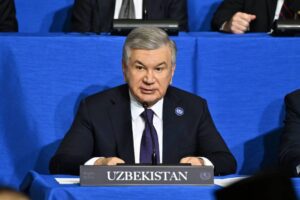UAE and ROK Issue Joint Statement Following State Visit of UAE President to South Korea

Seoul, The Gulf Observer: On the occasion of the State Visit of President His Highness Sheikh Mohamed bin Zayed Al Nahyan to the Republic of Korea from 28 to 29 May 2024, the United Arab Emirates (UAE) and the Republic of Korea (ROK) have issued the following joint statement:
At the invitation of His Excellency Yoon Suk Yeol, President of the Republic of Korea (ROK), His Highness Sheikh Mohamed bin Zayed Al Nahyan, President of the United Arab Emirates (UAE), conducted a state visit to the Republic of Korea from 28 to 29 May 2024. On 29 May, His Excellency Yoon Suk Yeol and His Highness Sheikh Mohamed bin Zayed Al Nahyan held a summit meeting at the Presidential Office. During the summit, the two leaders agreed to deepen and further develop the Special Strategic Partnership between the two countries.
The two leaders expressed their steadfast commitment to strengthening strategic cooperation in priority fields including economy and investment, conventional energy and clean energy, peaceful nuclear energy, defense and defense technology, and cybersecurity; as well as other areas of mutual interest such as infrastructure, high-tech industry, space, water technology, information and communication technology, SMEs and startups, agriculture, maritime transportation, civil aviation, education, culture, and healthcare. Both leaders also explored the scope for trilateral cooperation with other partners, and exchanged their perspectives on extremism.
The two leaders also witnessed the signing of several agreements and Memorandums of Understanding on cooperation in sectors such as economy, investment, conventional energy, clean energy, peaceful nuclear energy, infrastructure, and culture.
I. Strengthening Cooperation in Key Areas
1. Economy and Investment
The two leaders acknowledged the strong and historical economic and investment ties that exist between the two countries, noting that bilateral non-oil trade reached USD 5.29 billion in 2023. They commended the official signing of the Comprehensive Economic Partnership Agreement (CEPA), which will nurture long-term, sustainable growth through trade, investment, and economic diversification between the two countries. Recognizing the genuine complementarity between the two economies, the leaders looked forward to the establishment of preferential conditions for trade and investment reflecting the growing economic ties that have evolved over recent decades.
The leaders underlined their commitment to expanding mutual investments, focusing on key sectors, including infrastructure, high-tech and emerging industries, space, information communication and technology, SMEs and startups, agriculture, and maritime transport. They emphasized that the UAE-Korea CEPA would reinforce East-West supply chains, facilitate two-way FDI flows, and enhance joint research and knowledge exchange across a range of sectors, including energy, advanced manufacturing, technology, food security, and healthcare. Both leaders pledged to enhance cooperation in protecting Intellectual Property Rights (IPR) in both countries.
Recognizing the importance of sustainable development and evidence-based policies, the leaders reiterated collaboration in sharing the latest statistical techniques, including the utilization of administrative data and Big Data, and in building a statistical portal to support business activities. They shared a vision to deepen collaboration in the tourism sector, leveraging unique cultural heritage and cutting-edge technologies to create enriching experiences for visitors. Through these efforts, the leaders expressed hope to build a dynamic partnership moving the economies towards a more innovative and inclusive future.
The leaders acknowledged significant progress in sectors such as transformation technology, medical devices, and hydrogen infrastructure following the visit of the President of the Republic of Korea to the UAE in January 2023. They noted the agreement on increased flight capacity in October 2023 as a major step forward in expanding cooperation in civil aviation, contributing to the exchange of people and goods between the two countries.
They evaluated joint investment initiatives, including the UAE’s commitment in January 2023 to invest USD 30 billion in strategic sectors in the Republic of Korea. UAE entities are currently exploring investment opportunities in excess of USD 6 billion through the UAE-Korea Sovereign Investment Partnership. The leaders reiterated the importance of expanding presence and cooperation in each other’s markets and fully harnessing numerous investment opportunities and incentives available in various sectors.
2. Conventional Energy and Clean Energy
The leaders recognized the importance of energy security and stability in global energy supply chains, commending the establishment of the Comprehensive Strategic Energy Partnership (CSEP) in January 2023, which enables joint collaboration across all energy sources, including conventional, renewable, and peaceful nuclear energy. They agreed on leveraging this partnership to accelerate investments in energy security, decarbonization, and climate action, noting that the partnership will foster sustainability and innovation for the benefit of their countries and the global community.
They highlighted their strides in clean and renewable energy technologies, including hydrogen and ammonia, and promoted responsible nuclear energy use, reflecting a shared commitment to a sustainable energy model for future needs. The leaders provided updates on efforts in deploying clean and renewable energy solutions central to addressing climate change and reducing greenhouse gas emissions. The President of the Republic of Korea commended the UAE’s leading role as the first country in the Middle East and North Africa to commit to net zero through the UAE’s Net Zero 2050 Strategy.
3. Peaceful Nuclear Energy
Recognizing nuclear energy as an area of national expertise, the leaders underscored the importance of collaborative efforts to lead international cooperation through existing and advanced nuclear technologies, promoting economic growth and energy security while meeting global climate change targets. They commended progress in the Barakah Nuclear Energy Project, noting the successful operation of four units at the Barakah Nuclear Energy Plant.
The leaders welcomed further cooperation in peaceful nuclear energy through the ROK-UAE High-level Consultation on Nuclear Cooperation. They agreed to seek potential cooperation in follow-up unit projects, joint entry into third countries, nuclear fuel supply chain, and Small Modular Reactors (SMRs).
4. Defense and Defense Technology
The leaders noted with satisfaction the cooperation between the two countries in facilitating knowledge and expertise sharing, and in exploring further opportunities in areas of common interest. They agreed to expand future-oriented cooperation in all defense fields through the Joint Higher Military Committee (JHMC), the regular ministerial-level consultative body.
They affirmed the importance of consolidating cooperation opportunities in cybersecurity, defense technology, and defense research and development (R&D). They reaffirmed the importance of closer alignment and engagement on key defense matters, including through the Ministries of Foreign Affairs and Ministries of Defense (2+2) consultations.
II. Cooperation in Other Areas of Mutual Interest
5. Education and Culture
The leaders agreed on enhancing bilateral cooperation in culture and committed to developing both the Republic of Korea and the UAE as global pioneers in the cultural arena. They recognized the value of leveraging current educational cooperation to achieve more extensive collaboration in education.
6. Healthcare
The leaders agreed to strengthen cooperation in public health and medical fields, including pharmaceuticals and medical devices. They committed to advancing exchange of knowledge and experience, training and research, and encouraging participation in cooperative activities of bio and medical professionals and organizations.
7. Agriculture
The leaders appreciated strong cooperation in agriculture and agreed to maintain and strengthen cooperation in sustainable agriculture, smart farming, climate-smart agriculture, seeds, and veterinary medicines to enhance agricultural productivity.
8. Space
Reaffirming the Special Strategic Partnership in space, the leaders underscored the importance of peaceful space use and agreed to enhance cooperation through knowledge exchange in space situational awareness, outer space technologies for sustainable development, space exploration, support of SMEs in the space sector, and utilization of existing space infrastructure. They noted ongoing efforts to facilitate cooperation between research and academic entities and expressed satisfaction with progress in advancing capacity building in both countries.
9. Advanced Technology
The leaders affirmed their keenness to cooperate in advanced technology, including AI and 5G, and encouraged industries to explore investment opportunities and joint projects. They commended the establishment of the Strategic Partnership on Industry and Advanced Technology (SPIAT) in January 2023 and looked forward to continued collaboration between academic and research institutions.
10. Development of Science Talent and Cooperation among Universities
The leaders underscored the significance of developing human resources in cutting-edge technologies and agreed to promote cooperation among universities. They looked forward to jointly nurturing key talent and engaging in collaborative research.
11. Intellectual Property
The leaders reaffirmed the importance of intellectual property in fostering sustainable economic development based on creativity and innovation. They welcomed the signing of the “MoU on Capacity Enhancement in the Intellectual Property Field,” expanding cooperation to include training of examiners in addition to patent examination.
12. SMEs and Startups
Recognizing the crucial role of SMEs as drivers of economic growth and innovation, the leaders appreciated the establishment of the Korea-UAE Committee for SMEs and Startups. They committed to fostering a conducive environment for entrepreneurship, creativity, and sustainable development and to continuing cooperation to expand trade, investment, and business activities between SMEs.
13. Cooperation in Railway Infrastructure
The leaders acknowledged the potential contribution of the MoU between Korea National Railway and Etihad Rail, agreeing to continue cooperation in the railway sector to deliver concrete outcomes from such partnerships.
14. Infrastructure Development Cooperation in Third Countries
They agreed to expand successful bilateral infrastructure cooperation to third countries by promoting partnerships among interested entities in infrastructure projects and creating investment and business opportunities.
III. Cooperation on Global and Regional Issues
15. Development Projects/Partnership in Africa
The leaders agreed to broaden cooperation with African partners in the development sector, exploring possibilities for conducting sustainable development projects that serve the interests of all respective parties.
16. Global Green Growth Institute
The leaders affirmed collaborative efforts to advance sustainable development and green growth initiatives through the Global Green Growth Institute (GGGI). They agreed to explore collaborative projects promoting renewable energy, enhancing climate resilience, and pursuing sustainable development. The UAE announced a contribution of USD 2 million annually for two years to GGGI’s “core fund,” valued by the Republic of Korea.
17. Climate Change (COP28)
The President of the Republic of Korea congratulated the UAE on successfully hosting the 28th Conference of the Parties to the United Nations Framework Convention on Climate Change (COP28) and expressed support for the UAE’s efforts in addressing global climate challenges. The two leaders pledged to enhance collaboration to ensure the success of COP28 and advance ambitious climate action.
18. United Nations Security Council
The President of the Republic of Korea congratulated the UAE on its successful tenure as a non-permanent member of the UN Security Council for the 2022-2023 term and commended the UAE’s active role in addressing critical global issues. The leaders agreed to continue cooperation on issues of mutual concern within the framework of the United Nations and to promote regional and international peace and security.
19. Extremism
The leaders agreed to strengthen cooperation in countering extremism, emphasizing the need to promote tolerance and coexistence among diverse communities. They acknowledged the importance of collaborative efforts to combat radicalization and enhance societal resilience.
Conclusion
Both leaders reaffirmed their commitment to furthering the UAE-ROK Special Strategic Partnership, ensuring that it continues to evolve and expand in various sectors for the benefit of both countries and their people. They agreed to maintain close communication and cooperation at all levels to address common challenges and achieve shared goals.
His Highness Sheikh Mohamed bin Zayed Al Nahyan expressed his gratitude to His Excellency Yoon Suk Yeol for the warm hospitality extended to him and his delegation during the state visit. He extended an invitation to His Excellency Yoon Suk Yeol to visit the UAE at a mutually convenient time.


